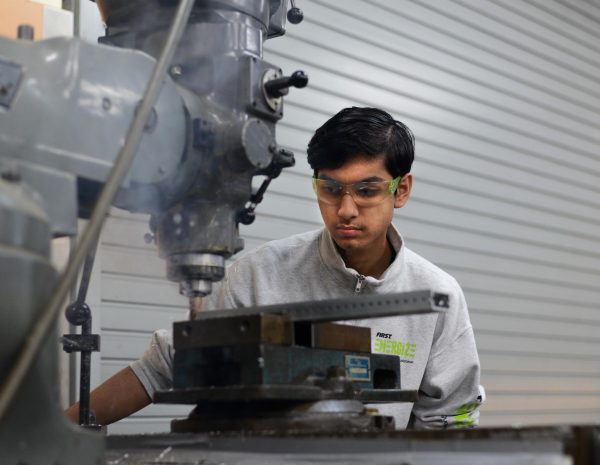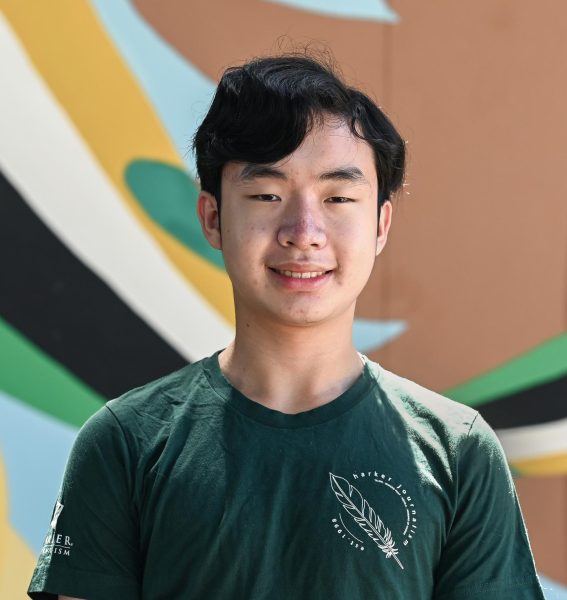
In the pits of a robotics competition of October 2023, the team was facing a problem: the robot collapsed into itself. Akul Goyal (’25) wasn’t supposed to arrive until later in the day, but within minutes of receiving a phone call from the team, he was already en route to the competition site. No questions. Just action.
By the time he stepped into the sweltering pits, the temperature pushing 100 degrees, Akul already formulated a plan. He coordinated the effort to dissemble the entire elevator mechanism, which previously took the team nearly two weeks to build, and fixed the robot within five to eight hours. The robot stood tall again, alive, with Akul’s leadership playing an essential role.
For Akul, life is a series of challenges waiting to be solved. From leading his school’s robotics team to speeding down the slopes as an avid skier, Akul embodies a relentless drive for excellence and creativity in everything he does. Whether crafting innovative solutions in his garage or fostering teamwork under high-pressure scenarios, Akul’s drive for engineering and leadership shines brightly.
Akul’s fascination with building and engineering began at an early age, fueled by summer camps and personal projects. His formative experiences include building an electric scooter and submersibles in middle school, solidifying his love for robotics.
When Akul joined Harker’s robotics team in frosh year, he found an outlet for his interests. Starting on the mechanical and machining subteam, he rose to become a director by his junior year. Akul’s role involves not only project management but also mentoring younger teammates and fostering a collaborative environment.
“I like having to face challenges and then being able to overcome the challenges,” Akul said. “I like it when there’s a technical difficulty or there is a task that seems impossible such as getting the robots to do monkey bars, but then as you work with a group of people and you think about it, you find a solution that seems feasible.”
He thrives on tackling technical difficulties, such as getting a robot to perform monkey bars or resolving elevator mechanism issues.
“When you’ve actually implemented, it doesn’t work and it’s disappointing the first time, but at the same time, really expected. And then as you iterate over and you put in a lot of time and effort into making it work, eventually it comes out and it ends up succeeding. And that’s really exciting.”
As a leader, Akul’s approach is defined by empowerment and inclusivity. Akul delegates tasks not as mundane chores but as opportunities for growth, ensuring his team members are fully engaged in the creative process.
“When I get new people in my team, I try to train them to the level where they know that they can contribute and they feel comfortable doing tasks that are assigned to them by themselves,” Akul said.
Brendon Hayes (’25), a close friend and former teammate, describes Akul as a mediator who excels at diffusing conflicts.
“During competitions, when the wiring for one of the sensors went down, instead of joining the cacophony of, ‘Oh, you did this, you didn’t do that,’ he just went and fixed the problem,” Brendon said. “He really tries to calm everyone down and keep it professional and productive rather than just yelling at each other and blaming each other for something that otherwise could have been avoided.”
While Akul’s dedication is unmatched, his sense of humor adds a unique dimension to his personality. Close friend and robotics teammate Aaron Chen (’25) shares stories of Akul’s lighthearted antics during build sessions.
“We always joke about eating the red grease that looks like strawberry jam or the very toxic white lithium grease,” Aaron said. “When he’s in the lab, it’s always a fun time building since he always comes up with some sort of shenanigans that makes the day interesting.”
This balance of seriousness and humor extends beyond robotics. Whether he’s engaging in playful lunchtime banter or helping a friend through a tough time, Akul’s authenticity shines through.
Robotics mentor Eric Nelson appreciates Akul’s leadership growth over the years to become more receptive to the input of others.
“He became more and more of a director,” Dr. Nelson said. “He had to find that balance between his individual contributions, and then also folding in the contributions of others and finding value in them.”
“It’s in the last year that I’ve seen a huge amount of growth in terms of actual leadership and listening to what people have to say, and then folding in his expertise, and he’s got quite a bit of it, particularly given that he’s only a senior in high school,” Dr. Nelson said.
Outside of robotics, Akul’s love for skiing reflects his passion for speed and adventure. Having learned to ski after moving to Washington in third grade, Akul grew up hitting the slopes several times a week.
“I have a need for speed,” Akul said. “I like adventure and so skiing gives me that because I can push myself and go really fast and then take more challenging slopes.”
Akul’s dedication to robotics also paved the way for his academic and professional aspirations. His favorite subject, neural networks, introduced him to the field of artificial intelligence, which he’s applied to research projects and summer programs at MIT. He emphasizes the value of close connections between teammates to create a cohesive community.
“Robotics is a really rewarding experience in that you learn a lot of skills and you can spend time with friends and the high-pressure environment makes your bond stronger with people as well,” Akul said. “There’s very little time and a lot of work that has to be done and the work has to be done perfectly otherwise things won’t work. But being able to handle that and then being able to communicate effectively with your team and then lead them and work with them is a critical skill.”


















![“[Building nerf blasters] became this outlet of creativity for me that hasn't been matched by anything else. The process [of] making a build complete to your desire is such a painstakingly difficult process, but I've had to learn from [the skills needed from] soldering to proper painting. There's so many different options for everything, if you think about it, it exists. The best part is [that] if it doesn't exist, you can build it yourself," Ishaan Parate said.](https://harkeraquila.com/wp-content/uploads/2022/08/DSC_8149-900x604.jpg)




![“When I came into high school, I was ready to be a follower. But DECA was a game changer for me. It helped me overcome my fear of public speaking, and it's played such a major role in who I've become today. To be able to successfully lead a chapter of 150 students, an officer team and be one of the upperclassmen I once really admired is something I'm [really] proud of,” Anvitha Tummala ('21) said.](https://harkeraquila.com/wp-content/uploads/2021/07/Screen-Shot-2021-07-25-at-9.50.05-AM-900x594.png)







![“I think getting up in the morning and having a sense of purpose [is exciting]. I think without a certain amount of drive, life is kind of obsolete and mundane, and I think having that every single day is what makes each day unique and kind of makes life exciting,” Neymika Jain (12) said.](https://harkeraquila.com/wp-content/uploads/2017/06/Screen-Shot-2017-06-03-at-4.54.16-PM.png)








![“My slogan is ‘slow feet, don’t eat, and I’m hungry.’ You need to run fast to get where you are–you aren't going to get those championships if you aren't fast,” Angel Cervantes (12) said. “I want to do well in school on my tests and in track and win championships for my team. I live by that, [and] I can do that anywhere: in the classroom or on the field.”](https://harkeraquila.com/wp-content/uploads/2018/06/DSC5146-900x601.jpg)
![“[Volleyball has] taught me how to fall correctly, and another thing it taught is that you don’t have to be the best at something to be good at it. If you just hit the ball in a smart way, then it still scores points and you’re good at it. You could be a background player and still make a much bigger impact on the team than you would think,” Anya Gert (’20) said.](https://harkeraquila.com/wp-content/uploads/2020/06/AnnaGert_JinTuan_HoHPhotoEdited-600x900.jpeg)

![“I'm not nearly there yet, but [my confidence has] definitely been getting better since I was pretty shy and timid coming into Harker my freshman year. I know that there's a lot of people that are really confident in what they do, and I really admire them. Everyone's so driven and that has really pushed me to kind of try to find my own place in high school and be more confident,” Alyssa Huang (’20) said.](https://harkeraquila.com/wp-content/uploads/2020/06/AlyssaHuang_EmilyChen_HoHPhoto-900x749.jpeg)



